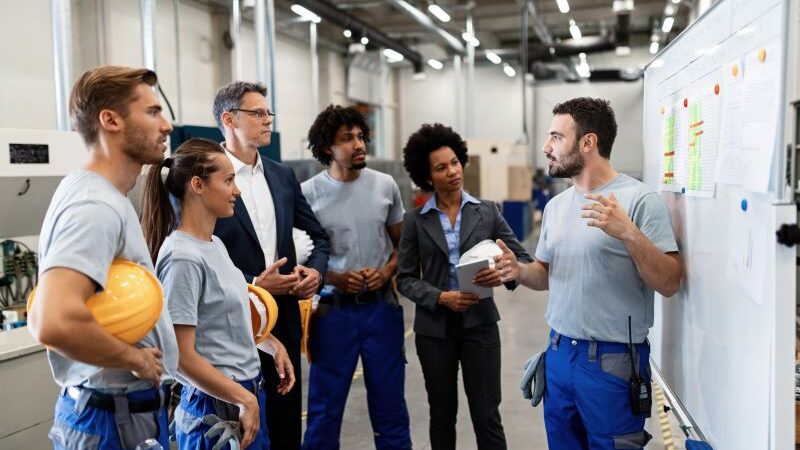Article by Dale Grant – Marketing Coordinator
Commercial construction projects ranging from minor renovations to the erection of completely new structures share one thing in common. They are a carefully coordinated symphony of collaboration between industry professionals each with their own set of skills and responsibilities with each person’s task a piece in the overall puzzle of the project.
Every project requires a complex series of processes, each requiring tools, manpower and materials, it is easy to see just how quickly a construction site can become dangerous without a constant commitment to a Culture of Safety Excellence.
One of the best ways to promote safety on the jobsite is through Toolbox Talks.
Toolbox talks are an easy way for foremen and supervisors to keep safety front of mind on their site.

What exactly is a Toolbox Talk?
A toolbox talk is typically a brief informal safety meeting to discuss important safety topics as a group. Topics discussed at these meetings can range from educating team members on important safety topics, to reinforcing best practices to addressing any immediate concerns on the project.
Toolbox talks are especially important because they provide an opportunity to have an open, relevant conversation about safety on the job site. By keeping safety top of mind in your team, you can significantly reduce work related injuries.
To conduct an effective Toolbox Talk, remember the following things.
Keep it Brief and Keep it Focused
An effective Toolbox Talk should be brief (10-15 minutes) and focused on the topic at hand and pertinent to the safety hazards of the current project.
Interactive and Practical
The reason it is referred to as a Toolbox Talk and not a Toolbox Lecture is that it should be a conversation, not just a presentation. A good Toolbox Talk should encourage real conversation between leadership and the team to ensure that safety concerns are addressed. This works best when people are able to freely share their experiences and ask questions. This will also serve to clarify any doubts about current safety procedures.
Conducted Regularly
Toolbox Talks should be conducted on a regular basis, often weekly. This not only serves to keep safety top of mind, but also allows specific safety concerns or hazards to be addressed in a timely manner.
Relevant
Toolbox Talks are more than just checking off a weekly box. These talks should involve topics related to the current phase of a project and the specific tasks that will be worked on at the time.
Document and Follow Up
Documentation of Toolbox talks is important for tracking safety and can be an important tool when it comes to compliance. It is important to follow up with the team in the days following a Toolbox Talk to ensure the topics discussed are being put into action.
Remember, by regularly holding toolbox talks, you can significantly reduce accidents and injuries, promote a Culture of Safety Excellence, and ensure that workers are informed about the best practices and potential hazards associated with their jobs.
Safety is never something to be learned about by accident!

